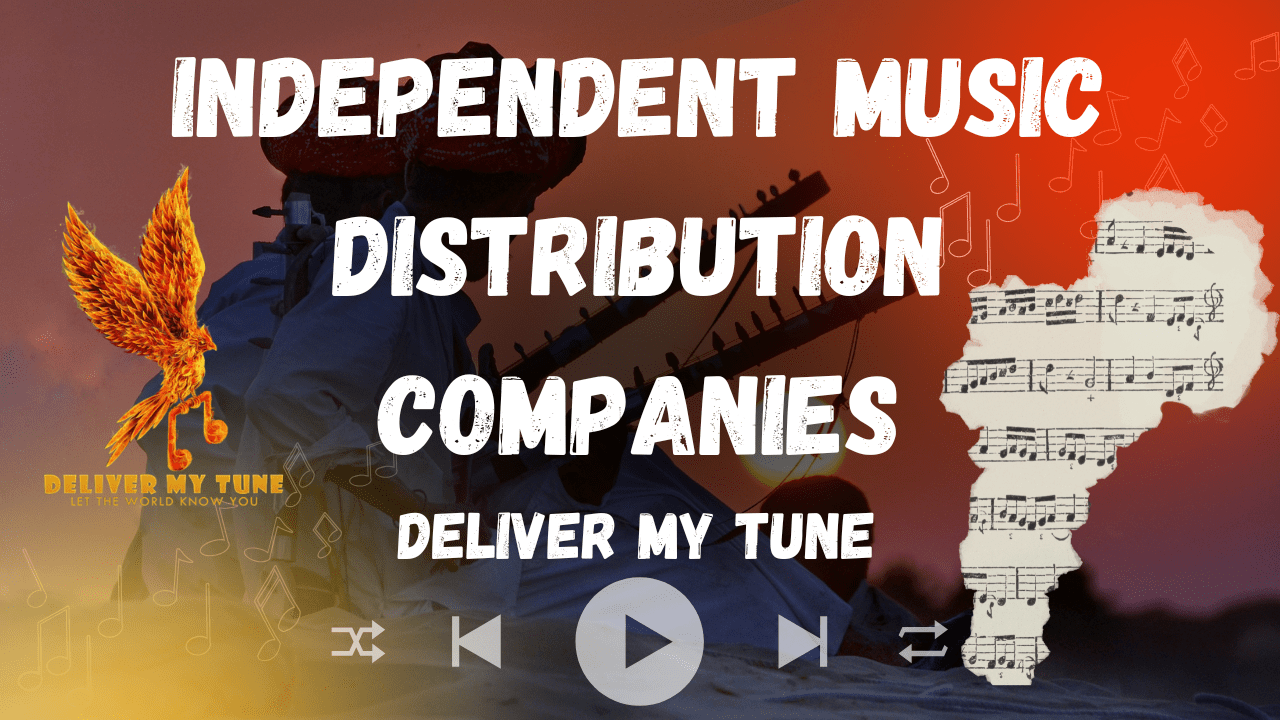The music industry has undergone a seismic shift in recent decades. Gone are the days when artists had to rely solely on record labels for distribution. Today, independent music distribution companies have emerged as a powerful alternative, empowering independent artists to distribute their music globally, maintain ownership, and earn fair royalties.
These companies have transformed the way music reaches listeners by providing affordable, transparent, and flexible solutions. For artists striving to make a mark, understanding how these platforms work and selecting the right one can be a game-changer.
This blog dives deep into the world of independent music distribution, explaining what these companies are, their benefits, challenges, and how to choose the best one for your music career.
What Are Independent Music Distribution Companies?
Independent music distribution companies are platforms that help artists distribute their music across digital streaming platforms (DSPs) such as Spotify, Apple Music, YouTube Music, and Amazon Music. They act as intermediaries between artists and these platforms, ensuring that your music gets published and reaches a global audience.
Key Features of Indie Music Distributors:
- Wide Platform Reach: Most companies ensure your music is available on major DSPs and niche platforms alike.
- Transparency in Royalties: You can track where your earnings come from and how much you’re owed.
- Artist Control: Unlike traditional record labels, these companies do not own your music, giving you full creative and financial control.
- Additional Perks: Some companies offer services like playlist pitching, AI mastering, and detailed analytics.
How Independent Music Distribution Companies Are Reshaping the Industry
The rise of independent music distribution has democratized the music industry. Here’s how:
- Empowering Artists: Artists now have tools to distribute their music without signing restrictive contracts with record labels.
- Global Accessibility: Anyone with a song can upload it and potentially reach millions of listeners worldwide.
- Cost-Effectiveness: Flat-rate pricing models and affordable options have made professional distribution accessible to all artists.
- Artist Branding: With services like portfolio creation and social media integration, indie distributors help build a strong digital presence.
Benefits of Using Independent Music Distribution Companies
1. Retention of Rights
One of the biggest advantages of using independent distribution companies is that artists retain full ownership of their music. This ensures you have control over licensing, creative decisions, and future monetization.
2. Fair Royalty Splits
Traditional labels often take a hefty share of royalties. Indie distribution platforms usually take a flat fee or a small percentage, letting artists keep the bulk of their earnings.
3. Direct Fan Engagement
By skipping middlemen, artists can engage directly with their fans through streaming platforms, social media, and email marketing.
4. Flexibility in Releases
Artists can decide how, when, and where they want to release their music.
5. Access to Data
Platforms provide analytics on streams, audience demographics, and performance, which is invaluable for shaping future releases.
Top Independent Music Distribution Companies
Let’s explore some leading players in the independent music distribution space:
1. Deliver My Tune
- Features: Offers AI mastering, artist portfolio creation, and robust social media management services.
- Standout Benefit: Lifetime distribution with no hidden costs.
2. DistroKid
- Features: Unlimited uploads for an annual fee.
- Standout Benefit: Fast distribution speeds and user-friendly interface.
3. TuneCore
- Features: Offers comprehensive reporting tools and sync licensing.
- Standout Benefit: Lifetime earnings transparency.
4. CD Baby
- Features: Provides physical distribution and sync licensing services.
- Standout Benefit: No annual fees – a one-time charge for lifetime distribution.
5. Amuse
- Features: Free distribution services.
- Standout Benefit: Perfect for emerging artists looking for cost-effective solutions.
How to Choose the Right Independent Music Distribution Company
Selecting the right distribution platform depends on your career goals, budget, and specific needs. Here are some tips:
- Understand the Pricing Models: Some platforms charge upfront fees, while others take a percentage of your royalties. Choose one that aligns with your earnings expectations.
- Platform Reach: Ensure the distributor covers all major streaming platforms.
- Additional Services: Consider companies offering mastering, marketing, or playlist pitching as part of their packages.
- User Experience: Look for platforms with intuitive dashboards and real-time support.
- Royalties and Transparency: Ensure the platform provides clear and timely royalty payments.
Tools and Features Provided by Music Distribution Companies
The best independent music distribution companies offer more than just basic services. Here’s a closer look:
1. Playlist Pitching
Getting featured on playlists can dramatically increase streams. Many platforms have relationships with playlist curators or provide pitching tools.
2. AI Mastering
AI-driven mastering tools enhance your audio quality, ensuring it meets industry standards.
Some distributors, like Deliver My Tune, offer social media management services to help artists maintain an active online presence.
4. Analytics Tools
Understand where your streams are coming from, audience demographics, and more through advanced analytics.
5. Sync Licensing
Opportunities to license music for TV, film, and ads are often facilitated by top platforms.
How Independent Music Distribution Companies Differ From Record Labels
Independent music distribution companies are fundamentally different from traditional labels.
| Aspect | Independent Distribution | Traditional Labels |
|---|---|---|
| Ownership | Artist retains full ownership | Label often takes ownership |
| Royalties | Transparent, artist-first policies | Labels keep a larger share |
| Flexibility | Artists choose release terms | Labels dictate schedules |
| Services | Distribution and marketing tools | End-to-end, but restrictive |
| Cost | Flat fees or small commissions | Upfront investments and hidden costs |
Challenges in Independent Music Distribution
While the benefits are immense, challenges exist too:
- Discoverability: With millions of tracks released daily, cutting through the noise is a struggle.
- DIY Marketing: Unlike labels, indie artists must handle their promotions.
- Royalties Management: Managing earnings from multiple platforms can be complex.
- Limited Resources: Indie distributors might lack the resources of major labels.
Success Stories in Independent Music Distribution
Several globally renowned artists began their journey through independent music distribution. For example:
- Chance the Rapper: Leveraged free distribution tools to release his mixtapes.
- Lauv: Built a massive fanbase through independent releases and social media marketing.
These stories highlight the potential of independent music distribution companies to launch successful careers.
Future Trends in Independent Music Distribution
The landscape of music distribution is evolving rapidly. Here’s what the future holds:
- Blockchain Technology: Blockchain can offer transparent royalty tracking and direct fan payments.
- AI-Driven Insights: Advanced analytics tools will help artists optimize their releases.
- Direct-to-Fan Platforms: Platforms enabling artists to sell music directly to fans will gain traction.
- Localized Strategies: Distribution platforms may focus on regional and niche markets.
Tips for Succeeding with Independent Distribution
To make the most of your distribution efforts:
- Regular Releases: Frequent releases help you stay relevant.
- Leverage Social Media: Consistently engage with fans across platforms.
- Collaborate with Artists: Collaborations can help you reach new audiences.
- Optimize Metadata: Properly tag your tracks for better discoverability.
- Focus on Branding: Build a cohesive online persona to attract listeners.
Conclusion
Independent music distribution companies are reshaping the music industry, giving artists unprecedented control and opportunities. With the right tools, strategies, and platforms, any musician can build a sustainable career.
Explore the possibilities, take control of your music, and let the world hear your sound. For more insights, check out our other blogs on AI mastering, social media strategies, and distribution tips.
Related Articles:
For further reading, explore these related articles:
- How to Become a Successful Music Artist in India in 2024?
- Promo Cards on Spotify: A Game Changer for Artists
- Understanding ISRC Codes and Their Importance in Tracking and Distributing Your Music
For additional resources on music marketing and distribution, visit Deliver My Tune.






